-
A Look at the Effects of Industrial Waste
Businesses like appliance manufacturers, warehouses, and food processing facilities are some examples of producers of industrial waste near Atlanta. Although the amount of industrial waste that is produced is less than that of some other waste sources in the United States, its impact on the environment can be much higher.
Water that is discharged from factories, for example, can pollute rivers and lakes with substances like chemicals, waste, and dyes. This water pollution can kill wildlife and harm the overall ecosystem, and the effects of polluted water have left several plant and animal species endangered. Also, plastics that are disposed of improperly or sent to landfills do not break down and can pollute the environment and pose a hazard to animals.
Today, there are still many factories and facilities that do not practice responsible waste management that involves recycling and proper waste disposal. However, the environmental effects of industrial waste can be reduced when it is handled with the right techniques, and an efficient waste management plan can also help ensure a safe and clean work environment.
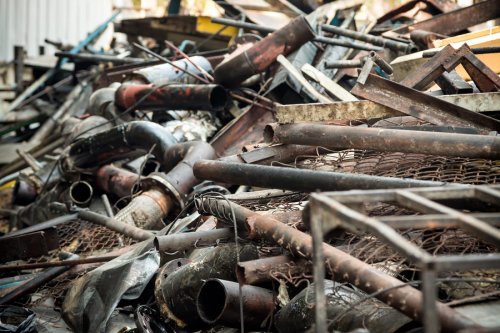
-
Recycling E-Waste
With the number of technological devices in use today, e-waste recycling serving Atlanta plays an important role when it comes to managing waste disposal . You’ve probably recycled a television, computer, or cell phone in the past, but have you ever wondered about the electronic recycling process? If so, then watch this video to see what happens when you recycle e-waste.
Most devices that have a cord or a circuit board can be processed at an e-waste recycling center. Using centrifugal forces, each electronic device that makes it to the plant is disassembled. Then, glass, plastic, copper, aluminum, and steel pieces are sorted and processed to be made into new materials.
-
Why Should Your Business Use a Baler?
Space is a constant concern among business owners. For many, the availability of space allows for the storage more merchandise, which can translate to higher sales. If your storeroom or warehouse is full of paper, cardboard, and other forms of waste, then you probably don’t have enough space for merchandise and other useful items. By renting a baler from a waste management company in Atlanta, you can break down your waste into compact bales and free up more space for your business.
There are a number of other benefits that come with renting a baler. For one, consolidating your waste can reduce the total number of waste disposal trips you make and help bring down the costs associated with waste. Under some circumstances, you may even be able to turn your recycling efforts into a whole new revenue stream. There are many businesses that can benefit from a baler, including distribution centers, department stores, office complexes, supermarkets, and large restaurants. If you have a lot of cardboard or paper that you’re not sure what to do with, talk to a waste management company near you about renting a baler.
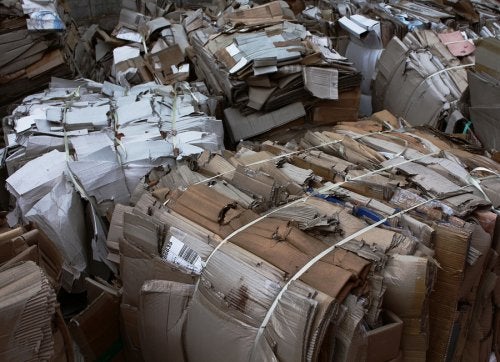
-
Ways to Reduce, Reuse, and Recycle for the Environment
As a business owner, it’s important to think of the best ways that your company can reduce, reuse, and recycle in Atlanta . Your local waste management company can provide you with valuable information about local recycling centers and key recycling facts that will help you implement a comprehensive recycling program in your building. Here are just some of the ways that you can reduce, reuse, and recycle throughout your company.
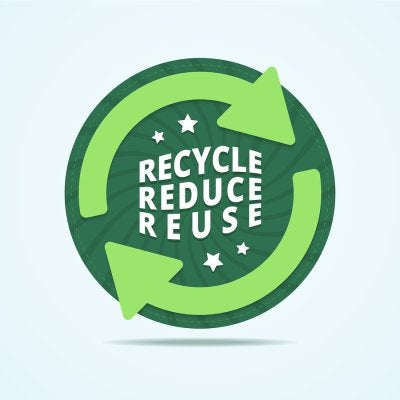
Reduce Your Use of Paper and Office Supplies
Most businesses generate a lot of waste, but you can reduce the waste you generate in a number of ways. Instead of printing out documents, develop an internal messaging system through which you can convey information to employees. Set up an e-billing system for vendors and clients so that you no longer receive paper copies of bills. Encourage employees to only use non-recyclable office supplies when it is absolutely necessary.
Order Green Products and Energy-Efficient Appliances
The person who is in charge of ordering company supplies can also contribute to your efforts to reduce, reuse, and recycle. You can order green products that can be recycled, or that are biodegradable and won’t contribute to hazardous waste or pollution. You can also purchase recycled and recyclable paper and packaging materials. When it’s time to replace office appliances, you can opt for appliances that are energy-efficient and that won’t contribute to pollution and hazardous waste.
Recycle and Reuse Whenever Possible
When you contact your local waste management company about garbage disposal and junk removal, you should also ask for some important recycling facts. Your waste management company can provide you with recycling bins to place around the building to encourage visitors and employees to recycle. If you’re in need of junk removal, you can find out if any items are eligible for scrap metal recycling, cardboard recycling, plastic recycling, or electronics recycling. You may also be able to share and reuse certain items, like file folders and envelopes, throughout the company.
-
How Metal is Recycled
If your company’s recycling program includes scrap metal recycling in Atlanta , you may be interested in learning more about how metal is recycled. Typically, recycling centers can manage metal recycling for copper, steel, aluminum, brass, iron, and metal wires. All recycling centers are different, however, so you should confirm what metal recycling capabilities yours has. Each type of metal is recycled in a different way.
Watch this video to learn more about how metal is recycled. Metal recycling can reduce the cost of your company’s waste disposal, improve your business’ environmental practices, and generate valuable, recycled materials rather than causing an increased demand for new products. Recycled metal can be used in the production of cans, cars, boats, metal casts, or ingots.
-
How to Reduce Waste at Your Office
Offices typically generate quite a bit of waste in Atlanta , from paper, plastics, and glass, to food waste and electronics waste. Your local waste management company can help you develop and implement a sustainable waste management program that allows you to reduce, reuse, and recycle throughout the office. Here are some great ways that you can reduce waste at your office.
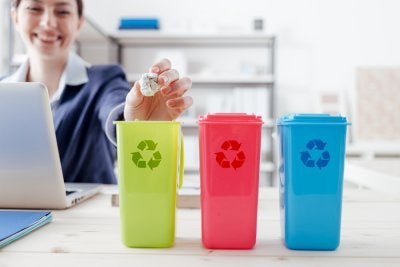
Reduce Waste Generation
You can quickly reduce the amount of waste that is generated throughout your office by reducing your reliance on paper products. Encourage employees to share information electronically, and resist printing out materials for your use or to convey information. You can also stop using cover sheets on faxes, print documents on both sides of the paper, use the copy machine less often, eliminate unnecessary forms or redesign them to use less paper, and post announcements electronically or on a central bulletin board. You can also use fewer paper products in your kitchens and bathrooms, and instead use washable, reusable products.
Reuse Valuable Materials
You can reuse valuable materials, like paper, throughout the office. Paper only has printing or writing on one side can be reused as scratch paper. File folders, internal envelopes, binders, packaging materials, and other office supplies can be shared and reused throughout the office. You can also donate items that can’t be used again within the office to other charities or organizations so that they won’t end up as waste.
Recycle and Compost When Possible
Your local recycling center can provide you with valuable recycling facts and can inform you as to which items are recyclable and compostable. Most recycling centers can process paper recycling, glass recycling, cardboard recycling, and plastic recycling. Some can also manage scrap metal recycling and electronics recycling. Do not dump or throw away any office item that can be safely recycled. Place recycling bins throughout the office, and arrange for your waste management company to pick up your recycling when they do your trash pickup. Most food waste can also be composted and used for fertilizer. Find out if your office generates food waste that is compostable, and ask your recycling center or waste management company about composting.
-
Essential Elements of Commercial Waste Management
Streamlining your commercial waste management practices can be a highly effective strategy for improving the profitability and sustainability of your business. With services from a company that specializes in waste management and recycling serving Atlanta , you will be able to determine which disposal methods will be best for your business. To ensure that your waste management provides your business with the best functionality, you will want to incorporate several essential elements.
Dumpsters, trash cans, and recycling bins are three essential commercial waste management tools. Trash cans are among the most important elements of a commercial waste management plan. Strategically placed trash cans can help you make sure that your employees and clients are throwing away their trash in the proper containers. Along with placing plenty of trash cans around your facility, you may also want to include recycling bins in your plan. At the end of the business day, a dumpster can be used to collect and house bulk amounts waste until it can be picked up.
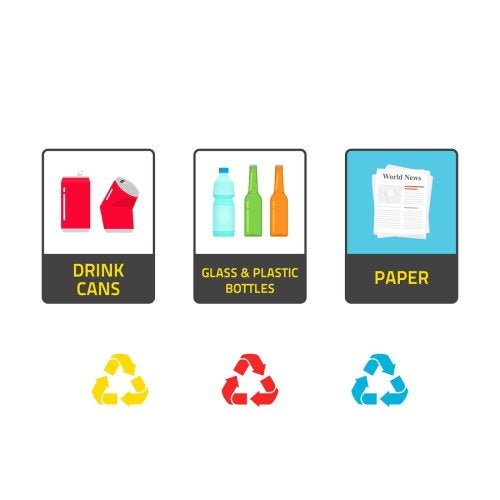
-
Examining Common Types of Manufacturing Waste
Manufacturing facilities rely on efficiency and streamlined production methods in order to create their products. However, even the most efficient manufacturing plants are bound to generate some form of waste. By working with a company offering waste management and recycling near Atlanta, you can reduce the amount of materials that you discard during the manufacturing process, while also making sure that your waste is disposed of in a safe and responsible manner. If you are creating a waste disposal plan for your manufacturing plant, read on to learn more about the most common types of manufacturing waste.
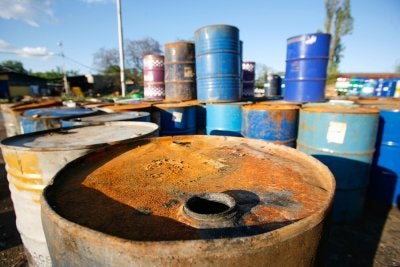
Solid Waste
Solid waste is a term that describes any paper, plastic, metal, or carbon based materials that are left over after the manufacturing process is completed. Some examples of solid waste include cardboard, scrap metals, or packaging materials. While some solid waste must be thrown in a dumpster, other forms of waste can be easily recycled. Recycling paper and cardboard can help you cut back on the carbon footprint of your manufacturing process.
Chemical Waste
Depending on the nature of the manufacturing process, certain facilities may generate large amounts of chemical waste. Unlike solid waste, which can be placed in a bin for disposal, chemical waste must be contained using special disposal methods. Many types of chemicals can cause environmental harm when they are not disposed of in a proper manner. Your waste management specialists can advise you on best chemical waste disposal practices for your business.
Toxic Waste
Toxic waste is an unavoidable byproduct of many manufacturing methods. While you may not be able to reduce the toxicity of certain kinds of waste, you can make sure that any toxic substances that are created in your plant are not allowed to contaminate the surrounding environment. Toxic waste disposal and management is regulated by governmental organizations, so you will want to make sure that your disposal plan is on par with environmental regulations for your county or state.
-
Understanding the Impact of Plastic Bottle Recycling
Even if you regularly recycle near Atlanta , you may sometimes find yourself without a recycling bin nearby. Plastic bottles are among the fastest growing components of the municipal waste in America, and tossing them in the trash can have a significant impact. Watch this video to learn about the impact of plastic bottle recycling.
The Environmental Protection Agency estimates that as much as 12% of all the solid waste in the United States is plastic products. Luckily, most plastic bottles are made of a material that is easy to recycle and reuse. The plastic recycling process saves a significant amount of resources and energy compared to acquiring and processing the materials needed to make a new bottle.
-
Are You Overlooking Recycling Opportunities at Your Restaurant?
If your restaurant currently participates in a program for recycling serving Atlanta , you may be wondering how you can further reduce your establishment’s carbon footprint. Luckily, you have several options available to you that can help your restaurant recycle more and waste less.
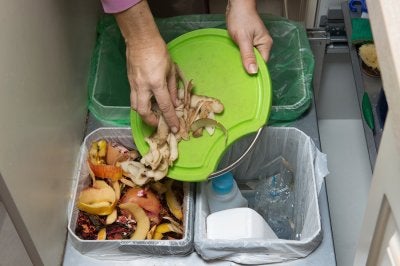
Starting an Organic Recycling Program
For farmers and gardeners, composting is a widely-used method for reusing food and foliage scraps to create a nutrient-dense amendment for soil. Today, composting is becoming a popular and more viable option for restaurants as well. Through organic recycling waste management programs, your establishment can increase its recycling rates, put food waste to better use, and promote a greener image to your customers and employees. Organic waste recycling programs often accept a wide range of food products that may include paper products, fruits, vegetables, meat, seafood, plants, cut flowers, dairy products, and eggs.
Using More Recyclable Materials
Once you have a recycling program in place in your restaurant, you can begin to look for additional opportunities for preventing waste. Your establishment probably uses quite a few materials that aren’t recyclable. First, find out if you can find recyclable alternatives to replace your non-recyclable supplies, and then create a strategy for using less of the items that do not have a recyclable counterpart. Cutting down on the amount of non-recyclables that are used in your restaurant is eco-friendly and can save you on supply and waste disposal costs.
Evaluating Your Recycling Practices
If you have educated your staff about the benefits and proper methods of recycling and make it easy for them to do so with the convenient placement of recycling bins, then you have already taken a significant step toward sustainability. However, it can be easy to overlook areas where your establishment can make improvements. Scheduling a waste audit with a waste recovery company will provide a thorough look at your restaurant’s waste production and can alert you to missed recycling opportunities.
RECENT POSTS
categories
- Uncategorized
- Waste Management Atlanta
- Waste Disposal and Recycling
- Hazardous Waste Disposal
- Chemical waste removal
- solid waste removal
- R3 Program
- Sustainable Organizations
- Sustainable Waste Removal
- Commercial Waste Removal
- Materials Management Program
- Dumpster Rental
- Roll Off Dumpsters
- Construction Site Waste Removal
- Sustainability
- Recycling in Atlanta
- Industrial Recycling
- Industrial Waste Removal Services
- Southern Waste & Recycling
- Waste Removal Atlanta
- Waste Specialists
- Atlanta
- Infographic
- Front Load Dumpsters
- Rear Load Dumpsters
- Reusable Electronics
- Dump Truck Atlanta
- Recyclable Electronics
- Trash Compactors
- Recycling
- Recycling Program
- Office Recycling
- Metal Recycle
- Electronic Waste
